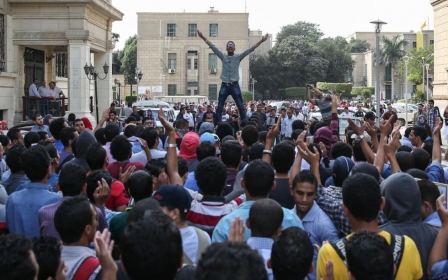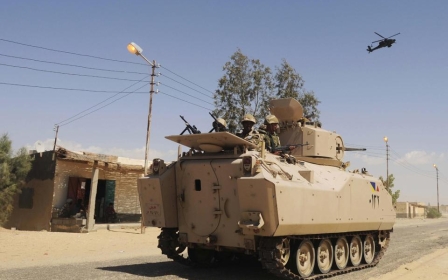Whatever happened to the Islamists of Egypt?

Not so long ago, Egypt was making headlines in western media. From 25 January, the 18-day revolution and the global hype it caused; to the rise of Islamists in its parliament taking over 70 percent of its seats. Then came the inauguration of its post-revolution president- now deposed and imprisoned: Morsi.
The headlines that came later mostly spoke of the protests that took place against the military coup on 3 July 2013 - and the extreme violence that was used later to disperse the protesters, killing thousands; described by Human Rights Watch as "the most serious incident of mass unlawful killings in modern Egyptian history."
Today, Egypt is no longer ruled by the Muslim Brotherhood, a military regime that replaced it with sheer violence. Images that dominate the Egyptian scene now are not any better; University students protesting against the regime and the security company that was hired by the Ministry of Education to keep order.
Or perhaps the images of Mohamed Soltan, laying on a portable bed while on trial and Soltan, the Egyptian-American who underwent a hunger strike for more than 10 months to protest his detainment on dubious charges. It is no different from the bizarre mass death sentences given to over five-hundred people who were against the coup, also on dubious charges.
More recent; a "presidential decree" was issued to give the military the responsibility to "protect" public facilities, which will include universities, and will put civilians under the rule of military courts. Never mind that the decree is actually against the current constitution. Overall, and it is not surprising that Egypt continues to be worse than it was under Mubarak who was toppled in February 2011.
Aside from the grave violations that could reach "crimes against humanity" (Human Rights Watch tried multiple times to contact Egyptian authorities with no success) matters still do not bode well for the current Egyptian regime. Whether it’s the man who recently hung himself on a billboard in a busy street, or the woman that was rejected treatment at a public hospital and was left to give birth on the pavement; in Egypt, news is always contentious.
Islamists in Egypt before the military coup were heavily scrutinised, and numerous analyses and features were readily available in western media. But what has happened to them now?
Apart from much - if not the majority - of Islamist leadership being detained or in exile, there is still a body that includes the majority of Islamist political parties. The Alliance which included all Islamist parties, but al-Noor, which supported the overthrow of Morsi, is proving more resilient than expected and still calls for protests, though much diminished in effect.
The al-Noor Party that stood with the 3 July coup has been seen as a fig leaf for the coup, used as a symbol of religiosity to be bestowed on the move against Morsi after the massive angry protests against his rule. Al-Noor Party - which ultimately participated in reshaping the post-revolution constitution that bans the participation of religious political parties - has become irrelevant and lost most of its grassroots base; at times losing membership of entire governorates. Many of those who left al-Noor joined al-Watan, which splintered from al-Noor in December 2012. Heads of al-Noor party have gone into occultation and rarely comment on current affairs.
The Brotherhood, which comprises the most organised core of Islamists in Egypt, has become decentralised and operates in small clusters. This is due to the unprecedented crackdown the group suffered, forcing it to operate in more secretive and prudent ways. The Brotherhood was declared a terrorist organisation in December 2013, and even the slightest public gesture of sympathy can land one in jail; including minors for having Raba signs (the symbol of the revolution) on their school stationary.
The Brotherhood has taken more blows than any other group in the post-Morsi period. Their losses include the direct murder of their leadership and their brethren, like the Supreme Head of the Brotherhood, Mohammed Badie, whose son, Ammar was shot dead, and Secretary General of the Freedom and Justice Party (the Brotherhood's political party) al-Beltagi's teenage daughter Asma sniped in Raba Square. Asma and others became icons of grief and steadfastness for those in the cause.
Such stories of suffering are very common among the Brotherhood, and perhaps they have made the group more intransigent in the face of brutality. The youth of the Brotherhood are practically in control of the social movement, and if the leadership in exile, or those very few left outside, were to forcefully attempt slowing or placating the group, they would fail. The Brotherhood, however, seems to be soul-searching, and has not been clear regarding the overall ideological direction it will take, despite the use of peaceful protest in the past. The Anti-Coup Alliance has been very keen to emphasise peacefulness in protests - at times with scornful tones - as some Brotherhood youth and plenty of other Islamists openly question the usefulness of anti-violence.
In any case, Islamists - and especially the Brotherhood - have had their backs to the wall in the conflict that is viewed as existential, and there has been no sign of backing down, despite the fact that for a long time, protests seemed to be of little use. The Brotherhood and other Islamists, however, are waiting the conflict out. They choose to see it as a conflict of attrition where the current balance of power is unsustainable, and another wave of revolution will ultimately prevail. More Egyptians may join, as alienation, political and harsh economic measures make life increasingly difficult for everyone. Many admit regret for joining the 30 of June protests as it turned out to be nothing but an excuse for the military to take over.
The current regime has closed political space for all forms of opposition and made media strictly self-censored. The regime does not only bar international human rights representatives from entering, but also has been going after prominent local leaders. One yearns for a glimpse of hope that conditions in Egypt might be relieved. Sadly, the current conditions are nothing but a recipe for disaster.
-Mustafa Salama is a political analyst, consultant and freelance writer. Salama has extensive experience and an academic background in Middle East Affairs.
The views expressed in this article belong to the author and do not necessarily reflect the editorial policy of Middle East Eye.
Photo: An Egyptian student of medical faculty of Cairo University lights a torch during an anti coup protest in Cairo, Egypt on 19 October (AA)
Stay informed with MEE's newsletters
Sign up to get the latest alerts, insights and analysis, starting with Turkey Unpacked
Middle East Eye delivers independent and unrivalled coverage and analysis of the Middle East, North Africa and beyond. To learn more about republishing this content and the associated fees, please fill out this form. More about MEE can be found here.





